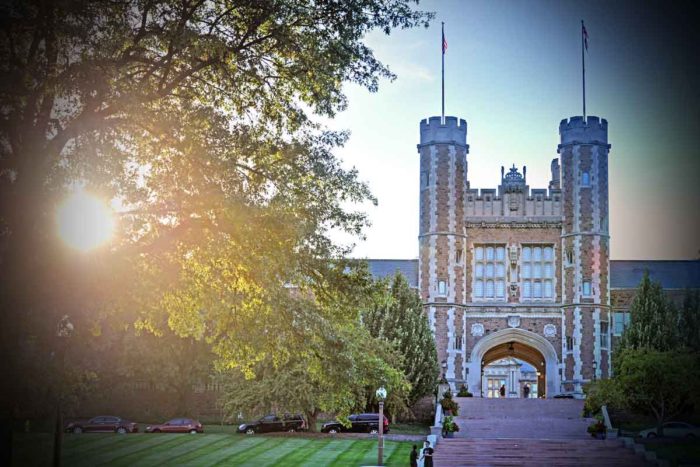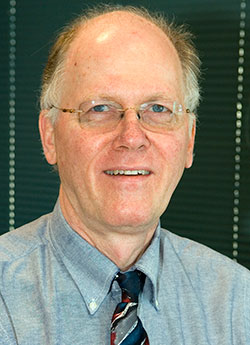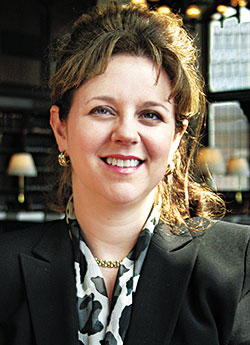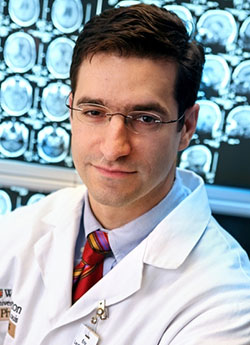Van Essen, Sadat to receive 2017 faculty achievement awards
Leuthardt to be honored for innovation and entrepreneurship
 James Byard
James ByardChancellor Mark S. Wrighton has announced the recipients of Washington University's 2017 faculty achievement awards.
David C. Van Essen, PhD, an authority on brain structure, function and development, and Leila Sadat, JD, an internationally renowned human rights expert, will receive Washington University in St. Louis’ 2017 faculty achievement awards, Chancellor Mark S. Wrighton announced.
Van Essen, the Alumni Endowed Professor of Neurobiology at Washington University School of Medicine, will receive the Carl and Gerty Cori Faculty Achievement Award.
Sadat, the James Carr Professor of International Criminal Law at the School of Law and director of the Whitney R. Harris World Law Institute, will receive the Arthur Holly Compton Faculty Achievement Award.
Wrighton also announced that Eric Leuthardt, MD, a professor of neurosurgery, of neuroscience, of biomedical engineering, and of mechanical engineering and applied science, and an expert in brain mapping and in devices that link the brain with computers, will receive the Chancellor’s Award for Innovation and Entrepreneurship.
The three will receive their awards and give presentations of their scholarly work Nov. 3.
“Professors Van Essen, Sadat and Leuthardt embody Washington University’s ideals by developing new knowledge that brings great benefit to society,” Wrighton said. “All three have made significant contributions to the university and within their fields. I am pleased that we are recognizing these very distinguished scholars.”

David C. Van Essen
Van Essen studies the structure, function, development and evolution of the cerebral cortex — the crumpled outer layer of the brain that is key to language, attention, perception, memory and other functions – in humans and in nonhuman primates.
Van Essen, also a professor of biomedical engineering, co-led the Human Connectome Project, which mapped the neural connections of healthy young adults. By shedding light on normal brain function, the project provided a baseline from which doctors can begin to identify differences that may be associated with disease. That effort also made major contributions in regard to how scientists acquire, analyze and share information about the living brain.
In 2016, Van Essen and his MD/PhD student Matthew F. Glasser published a detailed new map of the cerebral cortex that used data and techniques from the Human Connectome Project to delineate 180 brain regions so their connections could be more accurately mapped.
“There is an intimate linkage between the structure and the function of the brain,” Van Essen said. “If you want to find out what the brain can do, you first have to understand how it is organized and how all the parts connect to each other.”
He currently co-leads two projects that build on the techniques and findings of the Human Connectome Project. They involve scanning the brains of people of many ages, from kindergartners to centenarians. The goal is to capture the changes that occur as brains develop, mature and age over the lifespan.
A fellow of the American Association for the Advancement of Science since 1994, Van Essen was awarded the Krieg Cortical Discoverer Award from the Cajal Club in 2002, the Peter Raven Lifetime Achievement award from the St. Louis Academy of Science in 2007 and the Second Century Award from Washington University School of Medicine in 2015. Van Essen also has served as president of the Society for Neuroscience and was awarded the George A. Miller Prize for distinguished scholarship by the Cognitive Neuroscience Society earlier this year.
Van Essen earned his doctoral degree in neurobiology from Harvard Medical School in 1971. After postdoctoral fellowships at Harvard, the University of Oslo, and University College London, he joined the faculty of the California Institute of Technology. He came to Washington University in 1992 as the Edison Professor of Neurobiology and head of the Department of Anatomy and Neurobiology — now the Department of Neuroscience. He served as department head for two decades before stepping down in 2012.

Leila Nadya Sadat
Sadat, who joined the School of Law faculty in 1992, is an internationally renowned human rights expert specializing in international criminal law, public international law and foreign affairs.
The James Carr Professor of International Criminal Law at Washington University School of Law and director of the Whitney R. Harris World Law Institute since 2007, she is a devoted teacher and award-winning scholar, publishing more than 100 books, articles and essays in leading journals, academic presses and media outlets throughout the world.
In December 2012, International Criminal Court Prosecutor Fatou Bensouda appointed her as special adviser on crimes against humanity. Earlier that year she was elected to membership in the U.S. Council on Foreign Relations.
In 2011, she was awarded the Alexis de Tocqueville Distinguished Fulbright Chair in Paris, the first woman to receive such an honor.
In 2008, Sadat launched the Crimes Against Humanity Initiative, an international effort to study the problem of crimes against humanity and draft a global treaty addressing their punishment and prevention. The draft treaty is now available in seven languages and is currently being debated by the UN International Law Commission and governments around the world.
From 2001-2003 Sadat was a member of the U.S. Commission for International Religious Freedom.
Sadat has lectured or taught at academic institutions throughout the world, and holds or has held leadership positions in many professional associations and learned societies.
Prior to joining the faculty at Washington University, she practiced international commercial law in Paris for several years. Sadat clerked for Judge Albert Tate Jr., of the 5th U.S. Circuit Court of Appeals, and for both the French Conseil d’Etat and the Cour de Cassation.
Sadat earned her bachelor’s degree from Douglass College, her law degree from Tulane Law School (summa cum laude) and holds graduate law degrees from Columbia University School of Law (LLM, summa cum laude) and the University of Paris I – Sorbonne (diplôme d’études approfondies).

Eric Leuthardt
Leuthardt studies how the brain encodes information so researchers can develop electronic devices controlled by the mind. Such brain-computer interfaces could allow patients to use their thoughts to communicate, move artificial limbs or a paralyzed natural limb, or perform other neurological functions.
“For people who are cognitively normal but with movement problems – such as stroke, spinal cord injuries, or neuromuscular diseases – these kinds of devices could be a game changer,” Leuthardt said. “Up to now, the field of neurosurgery has been able to offer only very limited help to such people.”
As director of Washington University’s Center for Innovation in Neuroscience and Technology, he gathers neurosurgeons, engineers, mathematicians, physicists and computer scientists to collaborate and develop new technologies to improve neurosurgery. He has helped develop techniques to identify the location of brain functions such as language and motor function to minimize the chance that surgery will impair crucial abilities.
With more than 500 issued patents and six startup companies for medical devices and brain-computer interface technologies, Leuthardt is a prolific inventor. He was named a Top Young Innovator by the Massachusetts Institute of Technology’s magazine Technology Review in 2004, and won the annual award of the American Academy of Neurological Surgery that same year. In 2007, Leuthardt received the Innovation Award from the Academy of Science in St. Louis. He published the thriller novel “RedDevil 4” in 2014, and in 2016, he received an Emmy award for co-authoring the play “Brainworks.”
A native of Cincinnati, Leuthardt earned his bachelor’s degree in biology and theology at St. Louis University and his medical degree from the University of Pennsylvania School of Medicine before returning to St. Louis to do his residency in neurological surgery at Barnes-Jewish Hospital and Washington University School of Medicine. He joined the faculty of the School of Medicine in 2006.






